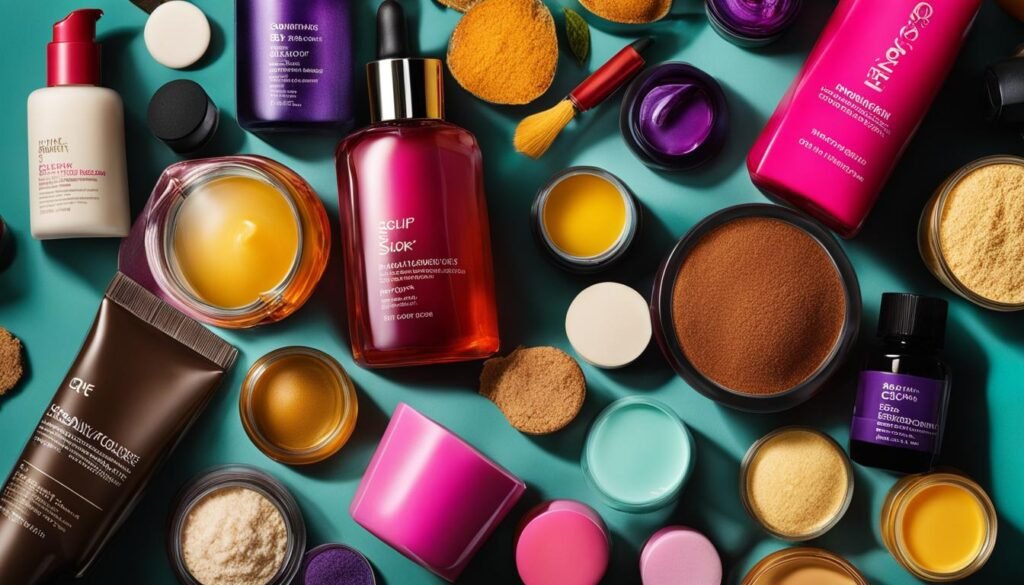Skin Care for Oily Skin : Oily skin can be a challenge to manage, but with the right tips and tricks, you can achieve a healthy and radiant complexion. Excess oil production can lead to shiny skin, enlarged pores, and acne breakouts. Understanding the causes of oily skin, such as genetics, hormones, diet, cosmetics, climate, and stress, is crucial in developing an effective skin care routine.
Choosing the best skincare products for oily skin is essential. Look for lightweight textures that absorb quickly and leave a matte finish. Ingredients like salicylic acid, niacinamide, tea tree oil, and zinc can help regulate oil production and reduce inflammation. Moisturizers with hydrating ingredients like hyaluronic acid and niacinamide can balance the skin’s oil production.
Don’t forget the importance of protecting your skin from the sun. Use a non-greasy sunscreen with at least SPF 30 to prevent sun damage and further oiliness. With the right approach, you can effectively manage oily skin and achieve a healthy and glowing complexion.
Key Takeaways:
- Excess oil production can lead to shiny skin, enlarged pores, and acne breakouts.
- Genetics, hormones, diet, cosmetics, climate, and stress can contribute to oily skin.
- Choose lightweight textures and ingredients that regulate oil production for oily skin products.
- Moisturize with ingredients like hyaluronic acid and niacinamide to balance oil production.
- Protect your skin from the sun with a non-greasy sunscreen.
What is Oily Skin and Why Does it Happen?
Oily skin is a common skin type characterized by excess oil production. Sebum, the oily substance naturally produced by the sebaceous glands, plays a vital role in keeping the skin soft and hydrated.
When the glands produce too much sebum, it can result in a shiny complexion, enlarged pores, and an increased risk of acne breakouts. Oily skin can be caused by various factors, including genetics, hormonal changes, diet, cosmetics, climate, and stress.
Genetics
Genetics can play a significant role in determining whether someone has oily skin. Some individuals may be predisposed to producing more sebum than others due to hereditary factors.
Hormones
Hormonal changes, such as those that occur during puberty, menstruation, or pregnancy, can lead to an increase in sebum production and result in oily skin.
Diet
Dietary factors can also contribute to oily skin. Consuming a diet high in greasy or fried foods, sugary snacks, and processed foods can stimulate excess sebum production.
Cosmetics
The use of heavy or comedogenic cosmetics, such as oil-based foundations or creams, can clog the pores and lead to oily skin.
Climate
Hot and humid climates can stimulate the sebaceous glands to produce more sebum, resulting in an oily complexion.
Stress
Stress can trigger hormonal fluctuations in the body, which can also contribute to excess oil production and oily skin.
Understanding these factors is crucial in developing an effective skincare routine tailored to oily skin. By addressing the underlying causes of oily skin and adopting suitable skincare practices, individuals can manage excess oil production and achieve a healthier complexion.
The Do’s for Managing Oily Skin
When it comes to managing oily skin, making the right choices in skincare products is crucial. Here are some essential tips to follow:
1. Opt for Lightweight Textures
Choose skincare products with lightweight textures, such as gels or oil-free liquids. These formulas absorb quickly into the skin, leaving a matte finish that helps control shine.
2. Look for Ingredients that Regulate Oil Production
When selecting products, pay attention to the ingredients that regulate oil production. Seek out key ingredients like salicylic acid, niacinamide, tea tree oil, zinc, aloe vera, clay, and alpha-hydroxy acids. These ingredients can help unclog pores, reduce inflammation, and balance your skin’s natural oil production.
3. Hydrate with the Right Moisturizers
Many people with oily skin avoid moisturizers, fearing that they will make their skin feel greasy. However, moisturizing is essential for oily skin as well. Look for moisturizers that contain hydrating ingredients like hyaluronic acid and niacinamide. These ingredients can help maintain the skin’s moisture barrier and prevent breakouts.
| Recommended Ingredients for Managing Oily Skin | Recommended Products |
|---|---|
| – Salicylic Acid | – The Ordinary Salicylic Acid 2% Masque |
| – Niacinamide | – Paula’s Choice 10% Niacinamide Booster |
| – Tea Tree Oil | – The Body Shop Tea Tree Oil |
| – Zinc | – La Roche-Posay Serozinc Toner |
| – Aloe Vera | – Benton Aloe Propolis Soothing Gel |
| – Clay | – Aztec Secret Indian Healing Clay |
| – Alpha-Hydroxy Acids | – COSRX AHA 7 Whitehead Power Liquid |
| – Hyaluronic Acid | – Neutrogena Hydro Boost Water Gel |
Remember, everyone’s skin is unique, so it’s essential to find the products that work best for you. Don’t be discouraged if it takes some trial and error to discover your ideal skincare routine.
“Choosing skincare products with ingredients like salicylic acid and niacinamide can help regulate oil production and promote healthier skin.”
By following these do’s for managing oily skin and incorporating suitable products into your skincare routine, you’ll be on your way to achieving a healthier, balanced complexion.
The Don’ts for Managing Oily Skin
When it comes to managing oily skin, there are certain practices that should be avoided. By steering clear of these practices, you can effectively control oiliness and maintain a healthy complexion.
Avoid Products with Comedogenic Ingredients
Comedogenic ingredients are substances that have a tendency to clog pores, leading to breakouts and further exacerbating oiliness. To prevent this, it is crucial to avoid products that contain comedogenic ingredients. Look for non-comedogenic alternatives that won’t clog your pores and contribute to oily skin.
Steer Clear of Heavy Oils and Creams
Using heavy oils and creams on oily skin can worsen oiliness and lead to clogged pores. These products tend to sit on the skin’s surface, trapping oil and causing congestion. Opt for lightweight and oil-free moisturizers and skincare products that won’t weigh down your skin or leave it feeling greasy.
Avoid Harsh and Irritating Ingredients
Harsh and irritating ingredients, such as parabens, fragrances, sulfates, SD Alcohol 40-B, and Ethanol, can strip the skin’s natural oils and disrupt its balance. This can cause inflammation and make oily skin concerns worse. When selecting skincare products, make sure to check the ingredient list and avoid products that contain these potentially harmful substances.
“Using heavy oils and creams on oily skin can worsen oiliness and lead to clogged pores.”
Tip: Look for products labeled as “gentle” or “suitable for oily skin” to ensure they won’t cause irritation or exacerbate oiliness.
Choose Gentle and Non-Irritating Skincare Products
Instead of using harsh and irritating products, opt for gentle skincare alternatives that are specifically formulated for oily skin. Look for products that are fragrance-free, sulfate-free, and alcohol-free. These products are less likely to cause inflammation or trigger excess oil production.
Avoiding these don’ts will help you on your journey to effectively managing oily skin. By selecting products without comedogenic ingredients, heavy oils and creams, or harsh, irritating substances, you can control oiliness, prevent breakouts, and achieve a healthier complexion.

The Ultimate Skin Care Routine for Oily Skin
A well-rounded skin care routine is vital for managing oily skin. By following this ultimate routine, you can balance oil production, prevent breakouts, and protect your skin from sun damage. Here’s everything you need to know:
1. Cleanse
Cleanse your skin twice a day using a gentle yet effective cleanser. Look for a product specifically formulated for oily skin to remove excess oil, dirt, and impurities without stripping your skin.
2. Exfoliate
Exfoliate once or twice a week to remove dead skin cells and unclog pores. Choose a gentle exfoliator with ingredients like salicylic acid or glycolic acid, which can help control oiliness and prevent breakouts.
3. Treatment
Treat your skin with products that target acne and oiliness. Benzoyl peroxide or retinol are effective ingredients to combat acne and control oil production. Use these treatments as directed and avoid overusing them, as they may cause skin irritation.
4. Moisturize
Moisturize your skin with a lightweight and oil-free moisturizer. Look for a product that hydrates your skin without adding extra oil. Ingredients like hyaluronic acid and niacinamide can help balance the skin’s moisture levels.
5. Sunscreen
Always apply sunscreen with at least SPF 30 every morning. Opt for a non-greasy sunscreen specifically designed for oily skin to protect your skin from harmful UV rays. Make sunscreen an essential step in your daily skin care routine.
| Cleanser | Exfoliator | Treatment | Moisturizer | Sunscreen |
|---|---|---|---|---|
| Kiehl’s Ultra Facial Oil-Free Gel Cleanser | Paula’s Choice Skin Perfecting 2% BHA Liquid Exfoliant | The Ordinary Niacinamide 10% + Zinc 1% | Neutrogena Hydro Boost Water Gel | La Roche-Posay Anthelios Clear Skin Oil Free Sunscreen SPF 60 |
| Peter Thomas Roth Anti-Aging Cleansing Gel | Mario Badescu Glycolic Foaming Cleanser | Paula’s Choice CLEAR Regular Strength Daily Skin Clearing Treatment | Simple Water Boost Hydrating Gel Cream | Supergoop! Unseen Sunscreen SPF 40 |
| Cetaphil DermaControl Oil Removing Foam Wash | Drunk Elephant T.L.C. Sukari Babyfacial | The INKEY List Retinol Serum | CeraVe AM Facial Moisturizing Lotion SPF 30 | EltaMD UV Clear Facial Sunscreen SPF 46 |

It’s important to note that everyone’s skin is unique, so it may take some trial and error to find the perfect products for your oily skin. Consult with a dermatologist for personalized recommendations if needed.
Best Products for Oily Skin
To effectively manage oily skin, it is important to choose the right products. Some recommended options include:
| Product | Description |
|---|---|
| Kiehl’s Rare Earth Deep Pore Daily Cleanser | Deep cleaning cleanser that effectively removes excess oil and impurities without overdrying the skin. |
| PanOxyl Acne Creamy Wash | Benzoyl peroxide cleanser specially formulated to eliminate acne-causing bacteria and control oil production. |
| Cetaphil DermaControl Oil Removing Foam Wash | Foaming cleanser that gently removes excess oil while maintaining the natural moisture balance of the skin. |
| Paula’s Choice Skin Balancing Pore-Reducing Toner | Pore-refining toner that helps minimize the appearance of pores and balance oily skin. |
| Neutrogena Pore Refining Toner | Acne-fighting toner that unclogs pores, reduces oiliness, and helps prevent breakouts. |
| Mario Badescu Glycolic Acid Toner | Exfoliating toner that gently removes dead skin cells, unclogs pores, and promotes a smoother complexion. |
| CeraVe PM Facial Moisturizing Lotion | Lightweight moisturizer that hydrates the skin without clogging pores, perfect for oily skin. |
| SkinMedica Ultra Sheer Moisturizer | Sheer moisturizer with oil-absorbing properties, ideal for oily skin types. |
| Origins Clear Improvement Moisturizer | Moisturizer specifically formulated for oily, acne-prone skin, helping to control oil and prevent breakouts. |
| The INKEY List Niacinamide Oil Control Serum | Oil regulating serum that reduces excess sebum production and helps minimize the appearance of pores. |
| Primally Pure Clarifying Serum | Serum specially designed to target acne scarring, promoting skin healing and reducing redness and discoloration. |
| Paula’s Choice Defense Antioxidant Pore Purifier | Pore-minimizing serum that helps to refine the appearance of enlarged pores and control excess oil. |
| Skinceuticals Clarifying Clay Masque | Deep cleaning face mask that draws out impurities, unclogs pores, and absorbs excess oil. |
| Neutrogena Pink Grapefruit 100% Hydrogel Mask | Sheet mask infused with pink grapefruit extract to cleanse pores, control oil, and leave the skin refreshed. |
| Andalou Naturals Pumpkin Honey Glycolic Mask | Exfoliating face mask enriched with pumpkin and honey to gently remove dead skin cells and minimize oiliness. |
| Origins Clear Improvement Active Charcoal Mask | Detoxifying face mask that uses activated charcoal to draw out impurities and absorb excess oil. |
| Paula’s Choice 2% BHA Liquid Exfoliant | Exfoliant with salicylic acid that unclogs pores, removes dead skin cells, and controls oiliness. |
| 100% Pure Fermented Rice Water Toner | Natural toner specifically formulated for oily skin, helping to balance oil production and refine pores. |
| Versed Sunday Morning Antioxidant Oil-Serum | Natural serum enriched with antioxidant-rich ingredients to soothe and nourish oily skin. |
| Raw Elements Certified Natural Sunscreen SPF 30 | Natural sunscreen with SPF 30 protection, specially formulated for oily skin and non-greasy. |
Remember to always patch test new products and consult a dermatologist if you have any specific concerns or allergies.

Natural Remedies for Oily Skin
When it comes to managing oily skin, natural remedies can be effective alternatives to commercial skincare products. With their antibacterial and soothing properties, honey and oatmeal are two natural ingredients that can help address oily skin concerns.
Honey: Honey has been used for centuries for its healing properties. It possesses antibacterial and antiseptic properties that help reduce bacteria on the skin and alleviate inflammation. When applied topically, honey can help control excess oil production and promote a healthier complexion.
Oatmeal: Oatmeal is renowned for its soothing and calming properties. It can absorb excess oil from the skin, reducing shine while simultaneously providing relief to inflamed or irritated skin. Oatmeal can also help unclog pores and exfoliate dead skin cells, leaving the skin feeling refreshed and revitalized.
To incorporate honey and oatmeal into your skincare routine, consider creating homemade masks or cleansers using these natural ingredients. Combine honey with other beneficial ingredients like yogurt or lemon juice to create a nourishing face mask. Alternatively, mix oatmeal with water or milk to form a gentle exfoliating scrub. By utilizing these natural remedies, you can effectively manage oily skin and achieve a healthier, more balanced complexion.

Using natural remedies like honey and oatmeal can provide an alternative and effective approach to managing oily skin. These ingredients harness the power of nature to reduce excess oil, control bacteria, and soothe inflammation. Consider incorporating these natural remedies into your skincare routine to achieve a clearer, healthier complexion.
Tips for Men with Oily Skin
Men with oily skin can follow similar tips and routines for managing excess oil. Here are some effective strategies for maintaining a healthy complexion:
1. Blotting Papers
Use blotting papers throughout the day to control shine. These thin sheets of absorbent material are specifically designed to soak up excess oil from the skin.
2. Post-Exercise Cleansing
After exercise, it is crucial to cleanse the face to remove sweat, oil, and dirt that can accumulate on the skin. Use a gentle cleanser suitable for oily skin to unclog pores and prevent breakouts.
3. Alcohol-Free Products
Avoid skincare products that contain alcohol, as they can trigger excess oil production and lead to further skin problems. Opt for alcohol-free products that are specifically formulated for oily skin to maintain a balanced complexion.
4. Avoid Heavy Creams and Greasy Ingredients
To prevent further oiliness, it is important to avoid heavy creams and greasy ingredients in your skincare products. Instead, choose lightweight moisturizers and oil-free formulations that won’t clog your pores.
5. Sunscreen for Oily Skin
Protecting your skin from the sun is crucial for all skin types, including oily skin. Look for sunscreen specifically formulated for oily skin, with a lightweight and non-greasy texture.
By following these tips, men with oily skin can effectively manage excess oil and maintain a healthy complexion.
Things to Avoid for Oily Skin
When managing oily skin, there are certain habits and practices that should be avoided to maintain a healthy complexion. By understanding what not to do, you can effectively control excess oil and reduce the risk of breakouts.
Blot Away Excess Oil
Excess oil on the skin can contribute to a shiny and greasy appearance. To control shine throughout the day, it is important to blot away excess oil using blotting papers. Gently press the blotting paper onto areas of the face prone to oiliness, such as the forehead, nose, and chin. This simple technique helps to absorb the excess oil without disturbing makeup or stripping the skin of its natural oils.
Skip Skin Cleansing After Exercise
Exercise can cause sweat, oil, and dirt to accumulate on the skin’s surface. Skipping cleansing after exercise can allow these impurities to clog pores and contribute to breakouts. It is crucial to cleanse the skin thoroughly after a workout to remove sweat, oil, and dirt, and prevent them from settling into the pores. Use a gentle cleanser specifically formulated for oily skin to effectively clean the skin without stripping away its natural moisture.
Choose the Wrong Products
Choosing the wrong skincare products can worsen oiliness and lead to breakouts. Avoid products that contain alcohol or heavy oils, as they can further clog pores and contribute to excess oil production. Look for oil-free and non-comedogenic products that are specifically formulated for oily skin. These products are designed to hydrate the skin without adding unnecessary oils or clogging the pores.
Skip Sunscreen
Sunscreen is a crucial step in any skincare routine, including for those with oily skin. Skipping sunscreen can leave the skin vulnerable to sun damage, premature aging, and an increased risk of skin cancer. Opt for oil-free and non-comedogenic sunscreens specifically formulated for oily skin. These sunscreens provide protection from harmful UV rays without clogging the pores or causing breakouts.
“Proper skincare for oily skin requires avoiding certain habits and practices. Blotting away excess oil, cleansing after exercise, choosing the right products, and applying sunscreen can help maintain a healthy complexion.”
| Things to Avoid for Oily Skin | Impact on the Skin |
|---|---|
| Blotting away excess oil | Controls shine and prevents a greasy appearance |
| Skin cleansing after exercise | Removes sweat, oil, and dirt to prevent clogged pores and breakouts |
| Choosing the wrong products | Worsens oiliness and can lead to breakouts |
| Skipping sunscreen | Leaves the skin vulnerable to sun damage, premature aging, and skin cancer |
Safety Considerations for Oily Skin
When it comes to managing oily skin, it’s important to keep safety considerations in mind. While treatments like benzoyl peroxide and salicylic acid can be effective for controlling oiliness and acne, it’s crucial to use them as instructed. Overuse of these treatments can lead to skin irritation, dryness, and redness. Therefore, it’s essential to follow the recommended usage guidelines to optimize their benefits and minimize any potential side effects.
In more severe cases of oily skin and acne, dermatologists may prescribe oral medications such as isotretinoin or oral contraceptives. These medications work internally to regulate hormones and reduce oil production. However, it’s important to consult with a dermatologist and carefully follow their instructions for proper usage and potential side effects. Regular check-ups and monitoring are also essential to ensure the medications are working effectively and safely.
Also Read : Pregnancy Safe Skin Care: Glowing & Secure
In addition to treatment considerations, protecting oily skin from sun damage is crucial. Using a broad-spectrum sunscreen with a minimum SPF of 30 is recommended for daily use. Sunscreen not only helps prevent sunburn, but it also protects the skin from harmful UV rays that can accelerate aging and increase the risk of skin cancer. Look for oil-free or non-comedogenic formulas specifically designed for oily skin to avoid clogging the pores.
It’s important to note that not all individuals may tolerate certain treatments or medications. If you experience any irritation, redness, or worsening of symptoms while using any products or medications, it’s advisable to consult with a dermatologist immediately. They can provide further guidance, make necessary adjustments to your skincare routine, or recommend alternative options to address your specific needs.
Note: It’s important to consult with a dermatologist or healthcare professional before starting any new treatments, medications, or making significant changes to your skincare routine.
Conclusion
Properly managing oily skin is essential for maintaining a healthy complexion. By developing a consistent skincare routine that includes cleansing, exfoliating, treating, moisturizing, and applying sunscreen, individuals with oily skin can effectively control excess oil and reduce the risk of breakouts. Choosing the right products, such as deep cleaning cleansers, exfoliating toners, and lightweight moisturizers, can further aid in managing oily skin.
In addition to using skincare products, natural remedies like honey and oatmeal can also be incorporated into the routine to help control excess oil and soothe inflamed skin. Men with oily skin can follow the same tips and adjust their routines accordingly.
It’s important to avoid certain habits and practices that can worsen oily skin, such as excessive blotting, skipping cleansing after exercise, using the wrong products, and neglecting sunscreen. By following these guidelines and making informed choices, individuals with oily skin can achieve a radiant complexion and effectively manage their skin health.
FAQ
Q: What are the essential skincare tips for oily skin?
A: Essential skincare tips for oily skin include using a gentle cleanser, choosing oil-free moisturizers, incorporating key ingredients like salicylic acid or niacinamide, and following a regular skincare routine for oily skin.
Q: How can I choose the right cleanser for my oily skin?
A: Look for a gentle cleanser specifically formulated for oily or acne-prone skin. Opt for a non-comedogenic and oil-free cleanser to effectively remove excess oil without stripping the skin.
Q: What are the key ingredients to look for in skincare products for oily skin?
A: Key ingredients to look for in skincare products for oily skin include salicylic acid, niacinamide, hyaluronic acid, glycolic acid, and benzoyl peroxide. These ingredients help to regulate oil production, unclog pores, and improve skin texture.
Q: How can I establish a skincare routine for oily skin?
A: To establish a skincare routine for oily skin, start with a gentle cleanser, followed by a toner to balance the skin’s pH, and then use products with key ingredients such as salicylic acid or niacinamide. Finish with an oil-free moisturizer and SPF during the day.
Q: What are the best ways to manage acne for oily skin?
A: Managing acne for oily skin involves using non-comedogenic products, incorporating targeted treatments like salicylic acid or benzoyl peroxide, and consulting a dermatologist for personalized recommendations.
Q: What is the importance of maintaining the skin’s protective barrier for oily skin?
A: Maintaining the skin’s protective barrier is crucial for oily skin as it helps to preserve hydration, protect against external aggressors, and prevent excessive oil production. This can be achieved through a balanced skincare routine and using products that support the skin barrier.
Q: How can I keep my oily skin balanced without stripping it of essential moisture?
A: To keep oily skin balanced without stripping it, opt for gentle, non-drying cleansers, incorporate lightweight hydrating products, and use oil-free moisturizers that provide hydration without adding excess oil to the skin.
Q: What are the benefits of using a toner for oily skin?
A: Using a toner for oily skin can help to remove any remaining traces of oil or impurities after cleansing, balance the skin’s pH levels, minimize the appearance of pores, and prepare the skin to better absorb subsequent skincare products.
Q: How can I reduce the appearance of fine lines and maintain a healthy-looking skin with oily skin?
A: You can reduce the appearance of fine lines and maintain a healthy-looking skin with oily skin by incorporating products with antioxidant-rich formulas, using lightweight hydrating serums, and applying SPF daily to protect against UV damage.
Q: What should I consider when choosing an oil-free moisturizer for oily skin?
A: When choosing an oil-free moisturizer for oily skin, consider products that are non-comedogenic, lightweight, and contain hydrating ingredients like hyaluronic acid. Look for formulas that provide hydration and mattify the skin without clogging pores.




